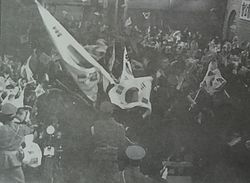Samil Undong
| March 1st Movement | |
|---|---|
 |
|
| Official name | March 1st Movement Samil Movement |
| Also called | Manse Demonstrations |
| Observed by | March 1, National holiday in South Korea since 1949 |
| Type | National |
| Significance | Marks one of the first public displays of Korean resistance during the Japanese occupation of Korea |
| Date | March 1, 1919 |
| March 1st Movement | |
| Hangul | |
|---|---|
| Hanja | |
| Revised Romanization | Samil Undong |
| McCune–Reischauer | Samil Undong |
The March 1st Movement, also known as Sam-il (3·1) Movement was one of the earliest public displays of Korean resistance during the ruling of Korea by Japan. The name refers to an event that occurred on March 1, 1919, hence the movement's name, literally meaning "Three-One Movement" or "March First Movement" in Korean. It is also sometimes referred to as the Man-se Demonstrations (Hangul: 만세운동; Hanja: ; RR: Manse Undong).
The Samil Movement came as a result of the repressive nature of colonial occupation under the military rule of the Japanese Empire following 1905, and the "Fourteen Points" outlining the right of national "self-determination" proclaimed by President Woodrow Wilson at the Paris Peace Conference in January 1919. After hearing news of Wilson’s speech, Korean students studying in Tokyo published a statement demanding freedom from colonial rule.
Adding to this was the death of former Emperor Gojong on January 21, 1919. There was widespread suspicion that he had been poisoned, credible since previous attempts (the "coffee plot") were well-known.
At 2 P.M. on March 1, 1919, 33 activists who formed the core of the Samil Movement convened at Taehwagwan Restaurant in Seoul and read the Korean Declaration of Independence that had been drawn up by historian Choe Nam-seon. The activists initially planned to assemble at Tapgol Park in downtown Seoul, but chose a more private location out of fear that the gathering might turn into a riot. The leaders of the movement signed the document and sent a copy to the Governor General.
...
Wikipedia
